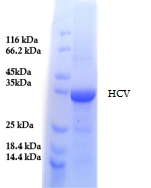HCV Core+NS3+NS4+NS5 Chimeric Recombinant Protein
Product code: PVBSP201
For laboratory use
Shipping: Shipped on Dry Ice
Storage Conditions: Store at -20 °C, avoid freeze/thaw cycles
Shelf Life: 12 months
Purity: > 95 % (SDS-PAGE, FPLC)
Source: E.Coli
Form: Liquid (Supplied in 50 mM Tris pH 8.5)
Applications:
Description:
The HCV Core+NS3+NS4+NS5 chimeric recombinant protein includes key antigenic regions from the Hepatitis C virus (HCV). This chimeric protein encompasses the core protein and non-structural proteins NS3, NS4, and NS5, providing broad antigenic coverage for diagnostic applications. The protein is expressed in a bacterial system and purified using advanced chromatographic techniques to ensure high purity and activity.
Background:
Hepatitis C virus (HCV) is a significant cause of chronic liver disease. The virus consists of a core protein and several non-structural proteins (NS3, NS4, NS5) that play crucial roles in viral replication and pathogenesis. The detection of antibodies against these proteins is essential for diagnosing HCV infection and monitoring disease progression. The chimeric protein provides comprehensive antigenic coverage, making it a valuable tool for diagnostic assays.
Specificity: Immunoreactive with sera from individuals infected with HCV, ensuring accurate detection of HCV-specific antibodies.
HCV Coupling Protein
Product code: PVBSP202
For laboratory use
Shipping: Shipped on Dry Ice
Storage Conditions: Store at -20 °C, avoid freeze/thaw cycles
Shelf Life: 12 months
Purity: > 95 % (SDS-PAGE, FPLC)
Source: E.Coli
Form: Liquid (Supplied in 50 mM Tris pH 8.5)
Applications:
Description:
The HCV coupling protein integrates multiple antigenic regions from HCV. This fusion protein ensures broad reactivity and is especially useful in diagnostic assays that need to detect antibodies against various HCV antigens. It is produced in an expression system and purified through advanced chromatographic methods to maintain high purity and functional integrity.
Background:
HCV coupling proteins are essential for comprehensive diagnosis of Hepatitis C. The virus’s complex structure includes several key antigens that need to be targeted for accurate detection. This coupling protein aids in the reliable diagnosis and monitoring of HCV infection, which is crucial for patient management and epidemiological studies.
Specificity: Immunoreactive with sera from individuals infected with HCV, ensuring comprehensive detection of HCV-specific antibodies.
Anti-HCV Monoclonal Antibody (Primary Antibody)
Product code: PVBSP203
For laboratory use
Shipping: Shipped on Dry Ice
Storage Conditions: Store at -20 °C, avoid freeze/thaw cycles
Shelf Life: 12 months
Purity: > 95 % (SDS-PAGE, FPLC)
Source: Mouse
Form: Liquid (Supplied in PBS, pH 7.4)
Applications:
Description:
This primary monoclonal antibody is highly specific to HCV antigens. Produced using hybridoma technology, it is purified using proprietary chromatographic techniques to ensure high specificity and binding affinity. Available in liquid form, it is provided in a PBS buffer to maintain stability and functionality.
Background:
Monoclonal antibodies against HCV antigens are crucial for diagnostic and research purposes. They enable the detection of HCV antigens, which is essential for early diagnosis and monitoring of infection. These antibodies are indispensable in developing sensitive and specific diagnostic assays. Understanding the role of HCV antigens in the virus’s lifecycle and immune evasion is pivotal for the development of effective HCV treatments and vaccines.
Specificity: Highly specific to HCV antigens, ensuring precise detection in various applications.
Anti-HCV Monoclonal Antibody (Secondary Antibody)
Product code: PVBSP204
For laboratory use
Shipping: Shipped on Dry Ice
Storage Conditions: Store at -20 °C, avoid freeze/thaw cycles
Shelf Life: 12 months
Purity: > 95 % (SDS-PAGE, FPLC)
Source: Mouse
Form: Liquid (Supplied in PBS, pH 7.4)
Applications:
Description:
This secondary monoclonal antibody is designed to bind specifically to a different epitope than primary antibodies targeting HCV antigens. It is produced using hybridoma technology and purified using proprietary chromatographic techniques to ensure high specificity and binding affinity. Provided in liquid form, it is supplied in PBS buffer for stability and ease of use.
Background:
Secondary antibodies are essential for amplifying the signal in diagnostic and research assays. They enhance the detection of HCV antigens by binding to a completely different epitope. This amplification is crucial for achieving the sensitivity needed in various diagnostic tests. Secondary antibodies also play a vital role in research, enabling the visualization and quantification of target antigens in complex biological samples.
Specificity: Highly specific to HCV antigens, ensuring precise detection in various applications.
The protein contains the full-length sequence of HIV-1 membrane glycoprotein (gp120) and transmembrane glycoprotein (gp41). The fusion protein was purified by proprietary chromatographic technique.
Treponema pallidum, the causative agent of syphilis, presents a complex antigenic structure. The detection of antibodies against the 15kDa, 17kDa, and 47kDa antigens is critical for accurate diagnosis of syphilis. The chimeric protein provides comprehensive antigenic coverage, making it a valuable tool for diagnostic assays aimed at identifying syphilis infection, which remains a significant public health concern.
The Dengue NS1 recombinant protein includes the non-structural protein 1 (NS1) from Dengue virus. This protein is essential for the early diagnosis of Dengue fever, as it is one of the first markers to appear during infection. It is expressed in a bacterial system and purified using advanced chromatographic techniques to ensure high purity and activity.
Pentavalent Bio Sciences Pvt. Ltd.
B-202, Block 1, First Floor, KSSIDC Complex, Electronic City, Phase 1, Bangalore – 560 100
Office: info@pentavalent.in, Sales: rahul.cmo@pentavalent.in Sales: +91 8861577102
© 2024, Pentavalent. All Rights Reserved.